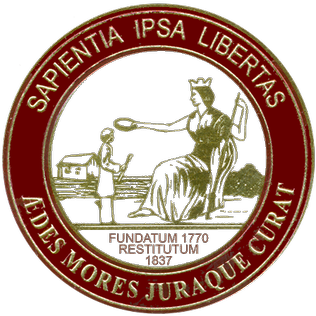
The College of Charleston is a public university in Charleston, South Carolina, United States. Founded in 1770 and chartered in 1785, it is the oldest university in South Carolina, the 13th-oldest institution of higher learning in the US, and the oldest municipal college in the nation.

EBSCO Information Services, headquartered in Ipswich, Massachusetts, is a division of EBSCO Industries Inc., a private company headquartered in Birmingham, Alabama. EBSCO provides products and services to libraries of many types around the world. Its products include EBSCONET, a complete e-resource management system, and EBSCOhost, which supplies a fee-based online research service with 375 full-text databases, a collection of 600,000-plus ebooks, subject indexes, point-of-care medical references, and an array of historical digital archives. In 2010, EBSCO introduced its EBSCO Discovery Service (EDS) to institutions, which allows searches of a portfolio of journals and magazines.
Artstor is a nonprofit organization that builds and distributes the Digital Library, an online resource of more than 2.5 million images in the arts, architecture, humanities, and sciences, and Shared Shelf, a Web-based cataloging and image management software service that allows institutions to catalog, edit, store, and share local collections.

Booklist is a publication of the American Library Association that provides critical reviews of books and audiovisual materials for all ages. Booklist's primary audience consists of libraries, educators, and booksellers. The magazine is available to subscribers in print and online. It is published 22 times per year, and reviews over 7,500 titles annually. The Booklist brand also offers a blog, various newsletters, and monthly webinars. The Booklist offices are located in the American Library Association headquarters in Chicago’s Gold Coast neighborhood.
Annual Reviews is an independent, non-profit academic publishing company based in San Mateo, California. As of 2021, it publishes 51 journals of review articles and Knowable Magazine, covering the fields of life, biomedical, physical, and social sciences. Review articles are usually "peer-invited" solicited submissions, often planned one to two years in advance, which go through a peer-review process. The organizational structure has three levels: a volunteer board of directors, editorial committees of experts for each journal, and paid employees.
Haworth Press was a publisher of scholarly, academic and trade books, and approximately 200 peer-reviewed academic journals. It was founded in 1978 by the publishing industry executives Bill Cohen and Patrick Mcloughlin. The name was taken from the township of Haworth in England, the home of the Brontë sisters. Many of the Haworth publications cover very specialized material, ranging from mental health, occupational therapy, psychology, psychiatry, addiction studies, social work, interdisciplinary social sciences, library & information science, LGBT studies, agriculture, pharmaceutical science, health care, medicine, and other fields.
Pulsus Group is a health informatics and digital marketing company and publisher of scientific, technical, and medical literature. It was formed in 1984, primarily to publish peer-reviewed medical journals. As of 2023, Pulsus published 1400 hybrid and full open-access journals, and a few of which had been adopted as the official publications of related medical societies. Pulsus Group also conducts conferences in association with scientific societies.
Chronicling America is an open access, open source newspaper database and companion website. It is produced by the United States National Digital Newspaper Program (NDNP), a partnership between the Library of Congress and the National Endowment for the Humanities. The NDNP was founded in 2005. The Chronicling America website was publicly launched in March 2007. It is hosted by the Library of Congress. Much of the content hosted on Chronicling America is in the public domain.

Peter Dain Suber is an American philosopher specializing in the philosophy of law and open access to knowledge. He is a Senior Researcher at the Berkman Klein Center for Internet & Society, Director of the Harvard Office for Scholarly Communication, and Director of the Harvard Open Access Project (HOAP). Suber is known as a leading voice in the open access movement, and as the creator of the game Nomic.
IEEE Xplore digital library is a research database for discovery and access to journal articles, conference proceedings, technical standards, and related materials on computer science, electrical engineering and electronics, and allied fields. It contains material published mainly by the Institute of Electrical and Electronics Engineers (IEEE) and other partner publishers. IEEE Xplore provides web access to more than 5 million documents from publications in computer science, electrical engineering, electronics and allied fields. Its documents and other materials comprise more than 300 peer-reviewed journals, more than 1,900 global conferences, more than 11,000 technical standards, almost 5,000 ebooks, and over 500 online courses. Approximately 20,000 new documents are added each month. Anyone can search IEEE Xplore and find bibliographic records and abstracts for its contents, while access to full-text documents may require an individual or institutional subscription.
Scientific Research Publishing (SCIRP) is a predatory academic publisher of open-access electronic journals, conference proceedings, and scientific anthologies that are considered to be of questionable quality. As of December 2014, it offered 244 English-language open-access journals in the areas of science, technology, business, economy, and medicine.

Jeffrey Beall is an American librarian and library scientist who drew attention to "predatory open access publishing", a term he coined, and created Beall's list, a list of potentially predatory open-access publishers. He is a critic of the open access publishing movement and particularly how predatory publishers use the open access concept, and is known for his blog Scholarly Open Access. He has also written on this topic in The Charleston Advisor, in Nature, in Learned Publishing, and elsewhere.
Kanopy is an on-demand streaming video platform for public and academic libraries that offers films, TV shows, educational videos and documentaries. The service is free for end users, but libraries pay fees on a pay-per-view model, from which content owners and content creators are paid.

The Charleston Conference is an annual event for academic libraries, librarians, and publishers, held in Charleston, South Carolina, in the United States. It focuses on topics such as academic library acquisitions, serials, and library infrastructure and technology.
Neuropsychiatry is a quarterly peer-reviewed open access medical journal covering research on neuropsychiatry. The journal was established in 2011 and originally published by Future Medicine with Wayne Goodman and F. Markus Leweke serving as its founding editors-in-chief up to 2015. Under the Future Science imprint, the journal's impact factor ranged from 0.486 to 1.456 (2012-2015). Since 2016 it is published by Pulsus Group via its openaccessjournals.com imprint, which is on Jeffrey Beall's list of "potential, possible, or probable predatory scholarly open-access publishers". According to the Journal Citation Reports, the journal had a 2016 journal impact factor of 4.778. However, that impact factor was based on a total of 9 "citable items" in 2014, as no articles were deemed "citable" in subsequent years, and in 2018 the journal was omitted from the 2017 Journal Citation Reports.

Future Medicine is a privately owned company based in London, England, United Kingdom. It is part of Future Science Publishing Group, primarily to publish peer-reviewed medical journals. Future Medicine publishes hybrid and full open access journals.
Cabells is a scholarly analytics company based in Beaumont, Texas. Established in 1978 by management professor David Cabell, it originally maintained only a directory of verified business academic journals. Since then, it has grown to include Journalytics, a database with analytics on reputable journals, Predatory Reports, a database of predatory journals with violation reports, journal metrics, and manuscript preparation tools. Journalytics has been expanded to include many types of information about the included journals, such as article acceptance rates and average review times. As of 2017, the company's Journalytics platform contains over 11,000 journals. In June 2020, Cabells changed the name of its whitelist and blacklist to Journalytics and Predatory Reports, respectively. In May 2023, Cabells reduced their workforce by a third in a round of unannounced and instant layoffs.
The Oxford Research Encyclopedias (OREs), which includes 25 encyclopedias in different areas, is an encyclopedic collection published by Oxford University Press in print and online. Its website was entirely free during an initial development period of several years. Now there is a fee to access articles on this site, although a portion remains freely accessible. Three of encyclopedias resulted from a collaboration between Oxford University Press and National Association of Social Workers Press, American Institute of Physics, and International Studies Association.
Katina P. Strauch is a librarian, now retired, at the College of Charleston in Charleston, South Carolina. She is the founder and convener of the Charleston Conference, a national-level conference for libraries, librarians, and publishers. She has published extensively on librarianship, and is a co-editor of the Charleston Conference Proceedings, and a founding co-editor of Against the Grain, a periodical on topics in librarianship. Strauch has served on the National Museum and Library Services Board, which advises the Institute of Museum and Library Services.







